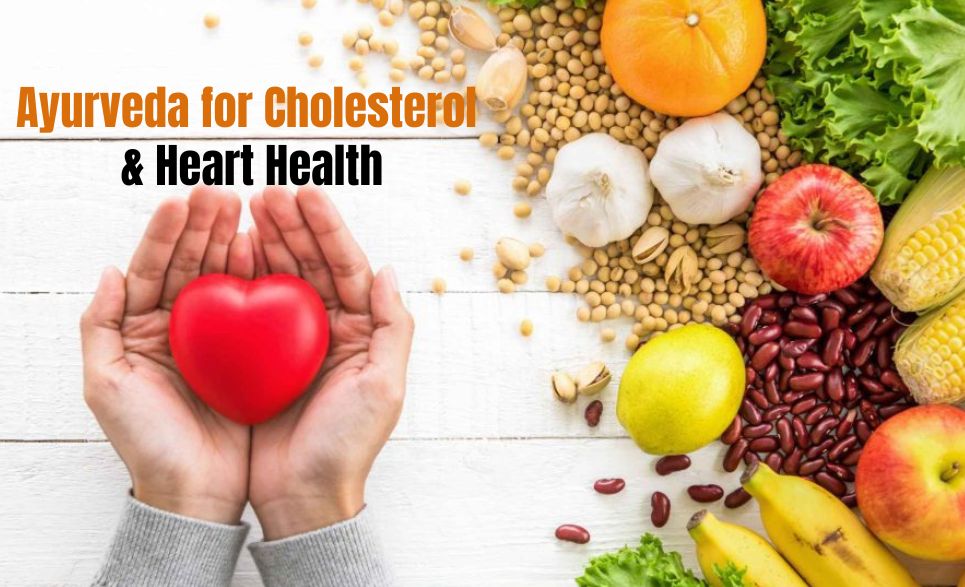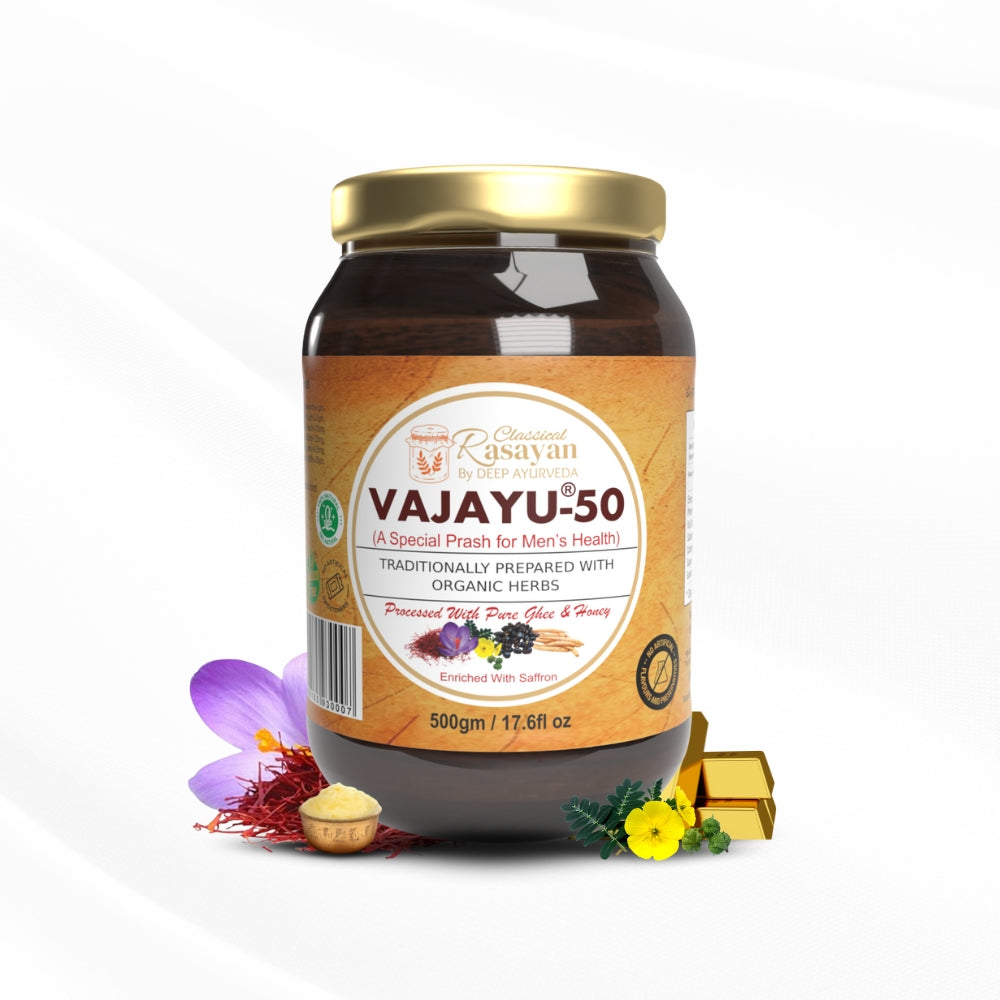"हृत् स्थानं चेतसः च प्राणानाम् च"
➤ The heart is considered the seat of Chetana (consciousness) and Prana (vital life energy).
Heart (hridaya) is one of the trimarmas of our body. Ayurveda views heart as central to both physical and emotional well-being. It is associated with the balance of the three doshas—Vata, Pitta, and Kapha—and is considered the abode of Ojas, the essence of vitality and immunity. The heart is also linked to several bodily channels (srotas), including:
Mano Vaha Srotas: Channel of the mind, influencing emotions and thoughts.
Prana Vaha Srotas: Channel of life force, governing respiration and energy flow.
Rasa Vaha Srotas: Channel of plasma and lymph, responsible for nutrient transport.
What is Cholesterol According to Ayurveda?

Ayurveda relates cholesterol imbalance with aggravated Kapha and Meda dhatu (fat tissue). Excessive Meda leads to blocked channels (Srotorodha), affecting heart function and blood circulation.
The Liver-Cholesterol Connection in Ayurveda
The liver (Yakrit) is crucial in the digestion of fats and proteins. When liver function is disturbed, it fails to properly metabolize fats, resulting in Ama (toxic residue) and abnormal cholesterol formation, leading to conditions like hypertension and atherosclerosis.
Ayurvedic Approach to Heart Care
Ayurvedic heart care is not just about lowering cholesterol; it's about strengthening the heart (Hridaya Balya), balancing doshas, and cleansing the body's channels (srotas) to allow free flow of nutrients and oxygen.
Powerful Ayurvedic Herbs for Cholesterol & Heart Health

Medohar Mahakashaya is a classical Ayurvedic formulation mentioned in ancient Ayurvedic texts, especially in Charaka Samhita, under the group of Mahakashayas (great decoctions). “Medohar” literally means "fat-reducing", and “Kashaya” means "decoction". Thus, Medohar Mahakashaya is a group of herbs that are primarily used to manage obesity and related metabolic disorders by reducing excess Medas Dhatu (fat tissue)/cholesterol.
|
Herb Name |
Botanical Name |
Properties |
|
Musta |
Cyperus rotundus |
Digestive, fat metabolizer |
|
Haritaki |
Terminalia chebula |
Detoxifier, mild laxative |
|
Vibhitaki |
Terminalia bellirica |
Astringent, anti-obesity |
|
Amalaki |
Emblica officinalis |
Antioxidant, Rasayana |
|
Aragvadha |
Cassia fistula |
Mild purgative, removes toxins |
|
Shunthi |
Zingiber officinale |
Boosts metabolism |
|
Pippali |
Piper longum |
Deepana (digestive enhancer) |
|
Maricha |
Piper nigrum |
Detoxifier, fat cutter |
|
Chitraka |
Plumbago zeylanica |
Stimulates digestion |
|
Vidanga |
Embelia ribes |
Detoxifier, anthelmintic |
|
Kutki |
Picrorhiza kurroa |
Liver protector |
|
Guduchi |
Tinospora cordifolia |
Immunity booster |
|
Daruharidra |
Berberis aristata |
Anti-inflammatory |
|
Gokshura |
Tribulus terrestris |
Diuretic, metabolism support |
|
Ativisha |
Aconitum heterophyllum |
Balances Pitta & Kapha |
|
Shatavari |
Asparagus racemosus |
Metabolism balancer |
|
Tagara |
Valeriana wallichii |
Calming, supports fat metabolism |
|
Devadaru |
Cedrus deodara |
Kapha balancing |
|
Haridra |
Curcuma longa |
Anti-inflammatory |
|
Trivrit |
Operculina turpethum |
Cleanses fat channels |
Hridaya Shodhak Mahakashaya refers to a potent group of heart-cleansing and heart-strengthening herbs in Ayurveda.
|
Herb |
Botanical Name |
Key Actions |
|
Terminalia arjuna |
Strengthens heart muscles |
|
|
Pushkarmool |
Inula racemosa |
Vasodilator, oxygenation support |
|
Guggul |
Commiphora mukul |
Clears channels, reduces cholesterol |
|
Allium sativum |
Blood thinner, anti-atherosclerotic |
|
|
Terminalia chebula |
Regulates digestion and blood pressure |
|
|
Guduchi |
Tinospora cordifolia |
Balances immunity and doshas |
|
Amalaki |
Emblica officinalis |
Antioxidant, anti-inflammatory |
|
Vasa |
Adhatoda vasica |
Supports circulation and respiration |
|
Boerhavia diffusa |
Diuretic, detoxifying |
|
|
Convolvulus pluricaulis |
Calms mind, reduces cardiac stress |
|
|
Mandukaparni |
Centella asiatica |
Microcirculation, anti-anxiety |
|
- |
Detox, gut and heart health support |
Arjuna Ksheer Pak
It is made by boiling Arjuna bark powder with milk and water. This method, known as Ksheer Pak Vidhi, extracts both water-soluble and fat-soluble active compounds from the herb, enhancing its therapeutic efficacy. The preparation is traditionally used to strengthen heart muscles, regulate blood pressure, and support overall cardiac function.
Bhaishajya Ratnavali – Hridroga Chikitsa Adhyaya (Chapter 33)
श्लोक:
"दुग्धेन योजितं क्वाथं तेन क्षीरेण पच्यते।
हृद्रोगं नाशयेत् पातुं अर्जुनं क्षीरपाकवत्॥"
When Arjuna bark is decocted in milk and water, and reduced like Ksheer Pak (milk decoction), it becomes an excellent remedy to pacify heart diseases.
Classical Ayurvedic Yog for Heart Diseases (Hridroga)
Arjunarishta
Hridayaasava
Trivang bhasma
Yogendra ras
Prabhakr vati
Abhrak basma
Lifestyle Tips for Ayurvedic Heart & Lipid Care
In Ayurveda, lifestyle is as important as herbs. Follow these cardio Ayurveda recommendations:
1) Avoid salt, fried food, and heavy Kapha-increasing diet
2) Practice brisk walking, yoga, and Pranayama (Anulom Vilom, Bhramari)
3) Warm water with lemon and honey early morning helps in fat digestion
4) Meditation and stress relief for Vata-Pitta balance
5) Nasya and Abhyanga therapy to clear channels and support circulation
Ayurvedic Diet for Cholesterol Management
Opt for a Kapha-balancing diet to reduce bad cholesterol:
-
Use cow ghee in moderation – it helps remove Ama from channels
-
Eat barley (yav), millets, green vegetables, garlic
-
Avoid dairy overload, refined oils, red meat, and processed sugars
- Drink Triphala tea or warm water with Trikatu powder
Panchakarma: Deep Detox for Heart Health
For those with chronic high cholesterol or risk of heart disease, Panchakarma therapy can be life-transforming. Especially:
-
Virechana (Purgation) – to balance Pitta and cleanse liver.
-
Basti (medicated enemas) – for Vata and fat metabolism
- Hridaya Basti – special localized basti over the heart region to strengthen it
Hridaya Basti (हृदये बस्ति) is a specialized Ayurvedic Panchakarma therapy focused on nourishing and strengthening the heart, both physically and emotionally. It involves retaining warm medicated oil or decoction over the heart region using a dough ring.It rejuvenates the cardiac muscles, relieves emotional stress, and balances Vata-Pitta dosha.
Key Actions of Ayurveda in lipid management
- Deepana & Pachana (Enhances digestive fire and metabolism)
- Lekhana (Scraping action on fat tissues)
- Medohara (Reduces fat, balances Meda Dhatu)
- Srotoshodhaka (Clears blocked bodily channels)
- Ama Pachana (Removes toxins from undigested food)






